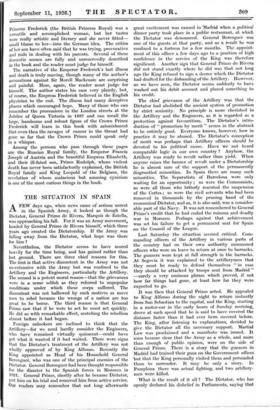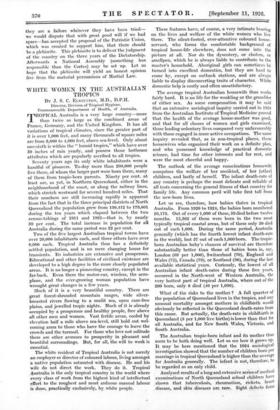THE SITUATION IN SPAIN
AFEW days ago, when news came of serious unrest in the Spanish Army, it looked as though the Dictator, General Primo de Rivera, Marquis de Estella, was approaching his fall. For it was an Army movement, headed by General Primo de Rivera himself, which three years ago created the Dictatorship. If the Army was falling away from the Dictator, what hope was there for him ?
Nevertheless, the Dictator seems to have scored heavily for the time being, and has gained rather than lost ground. There are three chief reasons for this. The first is that active discontent in the Army was not co-extensive with the Army but was confined to the Artillery and the Engineers, particularly the Artillery. The second is a potent moral reason—that the grievances were in a sense selfish as they referred to unpopular conditions under which these corps suffered. The discontent was not hallowed by such motives as move men to rebel because the wrongs of a nation are too great to be borne. The third reason is that General Primo saw that if he were to act he must act quickly. He did so with remarkable effect, scotching the rebellion almost beibre it had begun.
Foreign onlookers are inclined to think that the Artillery—for we need hardly consider the Engineers, who have remained virtually quiescent—could have got what it wanted if it had waited. There were signs that the Dictator's treatment of the Artillery was not wholly approved of by King Alfonso. Recently the King appointed as Head of his Household General Berenguer, who was one of the principal enemies of the Dictator. General Berenguer had been thought responsible for the disaster to the Spanish forces in Morocco in 1921. General Primo, shortly after he became Dictator, put him on his trial and removed him from active service. Our readers may remember that not long afterwards great excitement was caused in-Madrid when a political dinner party took place in a public restaurant, at which the Dictator was denounced. General Berenguer was one of the guests at that party, and as a result he was confined to a fortress for a few months. The appoint- ment of this officer a few days ago to a position of high confidence in the service of the King was therefore significant. Another sign that General Primo de Rivera did not stand exactly where he did was that not long ago the King refused to sign a decree which the Dictator had drafted for the disbanding of the Artillery. However, as we have seen, the Dictator seems suddenly to have washed out his debit account and placed something to his credit.
The chief grievance of the Artillery was that the Dictator had abolished the ancient system of promotion by strict seniority. No principle is more cherished in the Artillery and the Engineers, as it is regarded as a protection against favouritism. The Dictator's intro- duction of " promotion by merit " seems in the abstract to be entirely good. Everyone knows, however, how in practice it may be abused. The Dictator's conception of merit was perhaps that Artillery officers should be devoted to his political cause. Have we not heard comparable logic in our own country ? Anyhow, the Artillery was ready to revolt rather than yield. When anyone raises the banner of revolt under a Dictatorship he is almost sure of the support of the permanently disgruntled minorities. In Spain there are many such minorities. The Separatists of Barcelona were only waiting for an opportunity ; so were the Communists, so were all those who bitterly resented the suspension of the Cortes ; so were the civil servants who had been removed in thousands by the pruning hand of the economical Dictator, and so, it is also said, was a consider- able part of the Navy. It was not remembered to General Primo's credit that he had ended the ruinous and deadly war in Morocco. Perhaps against that achievement was set his failure to get a permanent seat for Spain on the Council of the League.
Last Saturday the situation seemed critical. Com- manding officers of the Artillery in various parts of the country had on their own authority summoned officers who were on leave to return at once to barracks. The gunners were kept at full strength in the barracks. At Segovia it was explained to the artillerymen that they must be ready to defend themselves " in case they should be attacked by troops sent from Madrid " —surely a very ominous phrase which proved, if not how far things had gone, at least how far they were expected to go.
It was then that General Primo acted. He appealed to King Alfonso during the night to return instantly from San Sebastian to the capital, and the King, starting in a motor-car in the early hours of Sunday morning, drove at such speed that he is said to have covered the distance faster than it had ever been covered before. The King, after listening to explanations, decided to give the Dictator all the necessary support. Martial Law was proclaimed and a manifesto was issued. It soon became clear that the Army as a whole, and more than enough of public opinion, were on the side of General Primo. There is a story that the gunners in Madrid had trained their guns on the Government offices but that the King personally visited them and persuaded them to surrender. It may be only a story. In Pamplona there was actual fighting, and two artillery. men were killed.
What is the result of it all ? The Dictator, who has openly declared his disbelief in Parliaments, saying that they are a failure wherever they have been tried— we would dispute that with great good will if we had space—has accepted the proposal of the Patriotic Union, which was created to support him, that there should be a plebiscite. This plebiscite is to deliver the judgment of the country on the three years of the Dictatorship. Afterwards a National Assembly (something less responsible than the Cortes) may be set up. Let us hope that the plebiscite will yield an honest opinion free from the material persuasions of Martial Law.







































 Previous page
Previous page